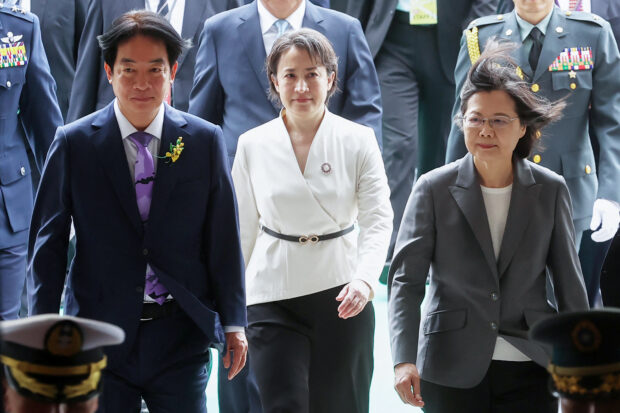China warns Taiwan of reprisals over Lai inauguration speech

This handout photo released by the Taipei News Photographer Association on May 20, 2024 shows Taiwan’s President Lai Ching-te (L), Vice President Hsiao Bi-khim (R) and former president Tsai Ing-wen (L) walking during the inauguration ceremony at the Presidential Office Building in Taipei. (Photo by Handout / TAIPEI NEWS PHOTOGRAPHER ASSOCIATION / AFP)
Beijing, China — China on Tuesday slammed the inauguration speech of new Taiwanese President Lai Ching-te as a “confession of Taiwan independence”, and warned it would take “countermeasures”.
Earlier, Beijing said it had complained to the United States over Secretary of State Antony Blinken congratulating Taiwan on Lai’s swearing-in.
China considers self-ruled Taiwan part of its territory and has not ruled out the use of force to bring the island under its control.
READ: Taiwan inauguration barely makes ripples across strait in China
It has branded Lai, who was sworn in on Monday, as a “dangerous separatist”.
Article continues after this advertisementIn his speech Monday, Lai said a “glorious era of Taiwan’s democracy has arrived” and thanked citizens for “refusing to be swayed by external forces, for resolutely defending democracy”.
Article continues after this advertisement“Yesterday’s speech… can be described as a downright ‘confession of Taiwan independence'”, a statement from Beijing’s Taiwan Affairs Office (TAO) released late Tuesday read.
It added that “(China) must take countermeasures and penalize the DPP authorities for colluding with external forces in their provocations for ‘independence'”.
The statement — attributed to TAO spokesperson Chen Binhua — did not specify what retaliatory measures from Beijing would entail.
Chinese warplanes and naval vessels maintain a near-daily presence around the island, but in recent days, there has not been a significant uptick in the numbers.
“I would like to emphasise that no matter what (Lai) says or how he says it, it will not change the status and fact that Taiwan is a part of China… The complete reunification of the motherland must be realised and can certainly be realised,” Chen’s statement added.
Also on Tuesday, China’s foreign minister Wang Yi said that Taiwan “separatists will be nailed to the pillar of shame in history”, according to a statement published by the ministry.
‘Insurmountable red line’
Taiwan has been self-governed since 1949, when nationalists fled to the island following their defeat by communist forces in the Chinese civil war on the mainland.
Washington switched diplomatic recognition from Taipei to Beijing in 1979, but it has remained Taiwan’s most important partner and biggest arms supplier.
Blinken said in his congratulations message that he looked forward to Washington and Taipei maintaining “peace and stability across the Taiwan Strait”.
Beijing said Tuesday his message “seriously violates the One China principle… and sends a wrong signal to separatist forces”.
“We are strongly dissatisfied and firmly opposed to this, and have lodged stern representations with the United States,” foreign ministry spokesman Wang Wenbin said at a regular news conference.
“The Taiwan issue is the core of China’s core interests and the first insurmountable red line in relations between China and the United States,” he added.
“We urge the United States to immediately correct its mistakes.”
Blinken’s statement came as China said Monday it would sanction three US defence companies over their sales of arms to Taiwan.
US President Joe Biden sent a delegation — including former National Economic Council director Brian Deese and ex-deputy secretary of state Richard Armitage — to Taipei for the inauguration.
More than 40 other countries, including Japan and Canada, also sent delegations.
Eight heads of state from countries that recognise Taiwan were also present.
China on Tuesday strongly condemned their attendance, calling it “crude interference in China’s internal affairs” and saying it “endanger(ed) peace and stability across the Taiwan Strait”.